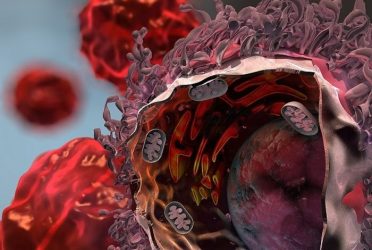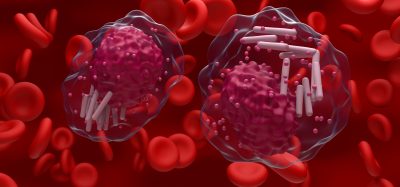Major lung cancer mechanism can be used to evade immune attack
Posted: 17 January 2023 | Izzy Wood (Drug Target Review) | No comments yet
US researchers found high levels of XBP1s in lung cancer cells, which plays a key part in regulating the local immune environment in lung tumours, and can be disabled to increase anti-cancer immunity


A protein, commonly found at high levels in lung cancer cells, controls a major immunosuppressive pathway that allows lung tumours to evade immune attack, according to a study led by researchers at Weill Cornell Medicine, US.
This discovery, published in Nature Communications, could hasten the development of treatments that overcome this tumour defence mechanism and improve outcomes for lung cancer patients.
The researchers analysed human lung cancer datasets and performed experiments in preclinical models of lung cancer to show that the transcription factor XBP1s enhances tumour survival by suppressing the anti-cancer activity of neighbouring immune cells. They discovered that XBP1s exerts this effect by driving the production of a powerful immunosuppressive molecule prostaglandin E2.
“We found that XBP1s is part of an important pathway in cancer cells that regulates the local immune environment in lung tumours, and can be disabled to increase anti-cancer immunity,” said study co-senior author Dr Vivek Mittal, the Gerald J. Ford-Wayne Isom Professor of Cardiothoracic Surgery and director of the Neuberger Berman Lung Cancer Laboratory at Weill Cornell Medicine.
There are nearly 250,000 new cases of lung cancer every year in the United States, and more than 130,000 lung cancer deaths, according to the American Cancer Society, making this form of cancer the leading cause of cancer mortality in the country. The majority of cases are of a type called non-small-cell lung cancer (NSCLC), which is often diagnosed at advanced stage of progression.
Newer treatments that attempt to dismantle cancers’ immune-suppressing defenses or attack tumours with engineered immune cells, have shown promise against other cancer types but have had very limited success against NSCLC. The researchers believe that this is due to NSCLC’s additional, undiscovered immune-suppressing mechanisms.
In the study, the researchers focused on the IRE1α-XBP1 arm of the unfolded protein response, a pathway that is chronically upregulated in many cancers. When IRE1α is triggered in cells undergoing stress, it starts producing XBP1s, a multitasking transcription factor that controls the expression of diverse gene programs in a context-specific manner.


Cancer cell experiencing endoplasmic reticulum stress (credit: Ella Marushchenko (2018))
The researchers analysed the expression levels of the gene encoding XBP1s from a large set of human NSCLC samples catalogued in a national database and found evidence that patients whose tumours had higher XBP1s levels had worse chances of survival. Consistent with that finding, they showed that knocking out IRE1α or XBP1s in NSCLC-like tumours in mice, led to tumour regression and markedly improved survival.
Further investigation revealed that the deletion of XBP1s in NSCLC cells impaired tumour growth by allowing the immune system to attack the tumour much more effectively. The scientists found that XBP1s, when produced within tumour cells, increased production of a strongly immunosuppressive molecule called prostaglandin E2, which is secreted into the tumour microenvironment- where it effectively suppresses the anti-cancer activity of immune cells.
These findings suggest that disabling IRE1α-XBP1s might be a good treatment strategy for NSCLC and might work particularly well in combination with other immunotherapy approaches.
“Targeting IRE1α-XBP1 could represent a very useful, two-pronged therapeutic approach that controls lung cancer progression while inducing protective anti-tumour immunity,” said added Dr Juan Cubillos-Ruiz, the William J. Ledger, Associate Professor for Infection and Immunology in Obstetrics and Gynaecology and co-leader of the Cancer Biology Programme at the Meyer Cancer Centre at Weill Cornell Medicine.
“We are now very interested in finding ways to target an IRE1α-blocking drug selectively to tumour cells,” Mittal concluded.
Related topics
Immunology, Immunotherapy, Oncology, Protein, Targets, Therapeutics
Related conditions
Non-small cell lung cancer (NSCLC)
Related organisations
Cancer Biology Programme at the Meyer Cancer Centre at Weill Cornell Medicine, Neuberger Berman Lung Cancer Laboratory at Weill Cornell Medicine, Weill Cornell Medicine
Related people
Dr Juan Cubillos-Ruiz, Dr Vivek Mittal








